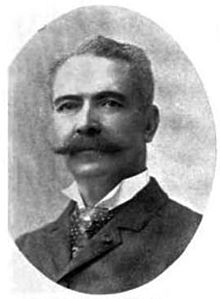Aimé Dupont
| Aimé Dupont | |
|---|---|
 |
|
| Born | 6 December 1841 Brussels, Belgium |
| Died | 16 February 1900 (aged 58) New York City, New York, US |
| Occupation | Photographer, sculptor |
Aimé Dupont (6 December 1841 – 16 February 1900) was a Belgian-born American sculptor and photographer who was best known for his pictures of opera singers when he was the official photographer for the Metropolitan Opera in New York City.
Dupont was born in Brussels, Belgium, the son of one of the city's leading photographers. He was educated at the School of Mines in Liège, where he learned how to quarry and polish stone for sculptures, as well as the technical process for creating photographic toning agents from minerals. After graduation, he moved to Paris, France, to work at Maison Walery as a photograph technician, but he sculpted in his free time. In the early 1870s, he decided to start his own photography and sculpting business on the Champs-Élysées. During this period, he married Etta Greer, an American woman who spent much of her girlhood in Paris.
He won some acclaim for both his arts, including a gold medal for photography in the Paris Exhibition of 1878. As a sculptor, he later was made a chevalier of the Legion d'honneur. One of his notable works was a bust of Elihu B. Washburne, who was the United States Ambassador to France during the Ulysses S. Grant administration.
As a result of the Panic of 1884, many of his sculpting clients were bankrupted and Dupont found he could no longer sustain his business. Under the advice of his wife, the couple moved to New York City, where they established a photography studio in Harlem, with Etta handling the finances so that Dupont could focus on the art. His business strategy was to focus on photographic portraits of celebrities. This proved to be so successful that in 1886 they moved the studio to 574 Fifth Avenue in Midtown Manhattan and he soon became the official photographer for the recently formed Metropolitan Opera. The new studio also included space for sculpting, but it was the photography that was far more lucrative.
...
Wikipedia
